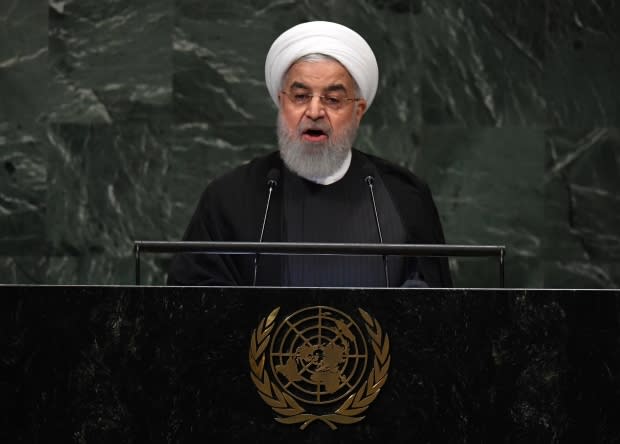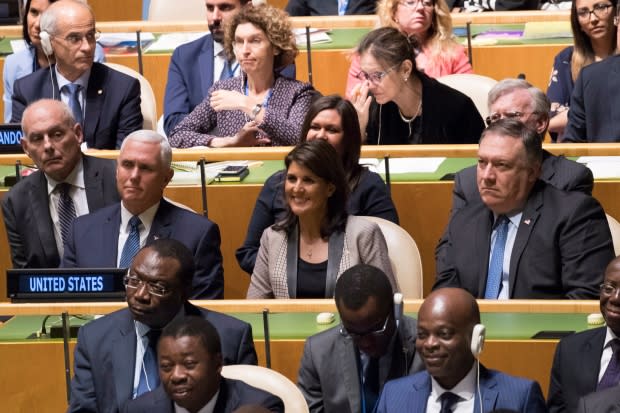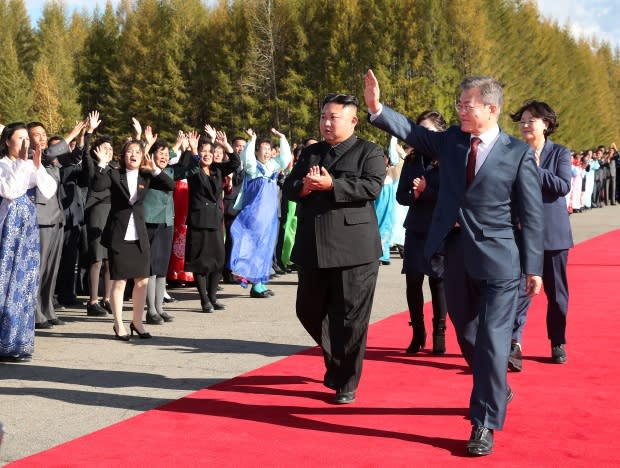Trump rejects globalism, touts 'doctrine of patriotism' at UN General Assembly
Promoting his aggressive "America First" agenda, U.S. President Donald Trump delivered a sharp rebuke of global governance at the United Nations on Tuesday.
Trump arrived late, forcing a last-minute scheduling switch, then received polite applause but also blank stares as he took his blustery brand of policies to the annual General Assembly.
Speaking in triumphal terms, Trump approached the address as an annual report to the world on his country's progress since his inauguration. He touted economic figures, declared that the U.S. military is "more powerful than it has ever been before," and crowed that in "less than two years, my administration has accomplished more than almost any administration in the history of our country."
Five sentences into the president's remarks, the audience began to chuckle and some leaders broke into outright laughter, suggesting the one-time reality television star's puffery is as familiar abroad as it is at home. Appearing briefly flustered, Trump smiled and joked that it was not the reaction he expected, "but that's all right."
The moment only reinforced Trump's isolation among allies and foes alike, as his nationalistic policies have created rifts with erstwhile partners and cast doubt in some circles about the reliability of American commitments around the world. Since taking office, Trump has removed the U.S. from the Paris climate accord, promoted protectionist tariffs and questioned the utility of alliances like NATO in furtherance of what he termed on Tuesday a strategy of "principled realism."
Trump said the U.S. rejects "global governance, control and domination." He said he honours the right of every nation to pursue its own customs, beliefs and traditions and added that the United States will never tell other nations how to live, work or worship.
Iranian President Hassan Rouhani, who spoke later Tuesday, condemned what he called the "recklessness and disregard of some states for international values and institutions" hours after Trump lambasted global governing and sharply criticized Iran to world leaders.

Rouhani launched into leaders who believe they can "ride public sentiments and gain popular support through the fomenting of extremist nationalism and racism," and through what he called "xenophobic tendencies resembling a Nazi disposition."
Trump, in his own speech, said Americans "reject the ideology of globalism" in favour of what he called "the doctrine of patriotism."
He also blasted what he called Iran's "corrupt dictatorship."
Watch as Trump takes on Iran in his General Assembly address:
In addition to the keynote speech, Trump is to chair a meeting of the UN Security Council on the topic of countering nuclear proliferation on Wednesday. His four days of choreographed foreign affairs were designed to stand in contrast to a presidency sometimes defined by disorder, but were quickly overshadowed by domestic political troubles.
The fate of his second Supreme Court nominee, Brett Kavanaugh, was in fresh doubt after a second allegation of sexual misconduct, which Kavanaugh denies.
Drama also swirls around the job security of Trump's deputy attorney general. Rod Rosenstein was reported last week to have floated the idea of secretly recording the president last year and to have raised the idea of using the 25th Amendment to remove him from office.
'ICC has no jurisdiction'
At the UN, Trump seized his opportunity to assert American independence from the international body. He was unapologetic about his decisions to engage with the erstwhile pariah North Korea, remove the U.S. from the international Iran nuclear accord and object to UN programs he believes are contrary to American interests.
He referenced a long list of UN initiatives, from the International Criminal Court to the Human Rights Council, that his administration is working to undermine.
"As far as America is concerned, the ICC has no jurisdiction, no legitimacy and no authority," he said. The U.S. is boycotting the Human Rights Council, arguing it overlooks abuses by some and serves as a venue for anti-American and anti-Israeli action.
"The U.S. will not tell you how to live and work or worship," Trump said. "We only ask that you honour our sovereignty in return."

Trump's denunciation of globalism drew murmurs from the room that stands as the very embodiment of the notion.
Other tense moments included his criticism of Germany's pursuit of a direct energy pipeline from Russia, which drew a dismissive headshake from a member of the U.S. ally's delegation. His mention of the United Arab Emirates, Saudi Arabia and Qatar all in one breath, was received by stone-faced Saudi officials. The UAE and Saudi Arabia have been boycotting Doha since last year as part of a political dispute tearing apart the typically clubby Gulf Arab nations.
The laughter in the first moments of the address evoked a campaign line Trump frequently deployed against his predecessor Barack Obama — who embraced international engagement — suggesting that due to weak American leadership, "the world is laughing at us."
In 2014, Trump tweeted "We need a President who isn't a laughing stock to the entire World. We need a truly great leader, a genius at strategy and winning. Respect!"
'It was a different world'
Appearances on the global stage tend to elevate the stature of presidents both abroad and at home. But even before his arrival for the annual gathering of world leaders and diplomats, the desired image was being eclipsed as Trump was forced to confront the salacious and embarrassing in the controversies over Deputy Attorney General Rosenstein and Supreme Court nominee Kavanaugh.
With cable news chyrons flashing breathless updates about both Beltway dramas, news of Trump's foreign policy moves from the UN, led by a new trade deal with South Korea, struggled to break through and disappointed White House aides.
A year ago, Trump stood at the international rostrum and derided the North Korean leader as "Little Rocket Man" and threatened to "totally destroy North Korea."
"It was a different world," Trump said Monday of his one-time moniker for Kim Jong-un. "That was a dangerous time. This is one year later, a much different time."
Trump praised Kim as "very open" and "terrific," despite the sluggish pace of progress toward denuclearization on the Korean Peninsula.
South Korean President Moon Jae-in delivered a personal message to Trump from Kim after their inter-Korean talks last week in Pyongyang.
"You are the only person who can solve this problem," Moon said to Trump, relaying Kim's words.

The president said the location for a second summit with Kim is still to be determined, but officials have said Trump is holding out hope it could take place on American soil. Such a move would present a complex political and logistical challenge for the North Korean leader. Trump has often fondly invoked the Singapore summit, a made-for-TV event that attracted the world's media attention and largely received positive marks from cable pundits — reviews that were not repeated for his summit with Russia's Vladimir Putin in Helsinki the following month.
Trump and Moon on Monday signed a new version of the U.S.-South Korean trade agreement, marking one of Trump's first successes in his effort to renegotiate economic deals on more favourable terms for the U.S. Trump labeled it a "very big deal" and said the new agreement makes significant improvements to reduce the trade deficit between the countries and create opportunities to export American products to South Korea.
In both venues, U.S. officials say, Trump is expected on Tuesday and Wednesday to offer a contrast between the path of negotiation chosen by North Korea and that of Iran. Trump earlier this year bucked allies and removed the U.S. from the 2015 Iran nuclear deal, citing Iran's malign influence in the region and support for groups like Hezbollah. The next round of tough sanctions on Iran is set to go into effect in November.
Iranian President Hassan Rouhani is in New York to attend UN meetings. U.S. officials said Trump is not seeking a meeting with him but is not opposed to talking if Iran requests a session.

